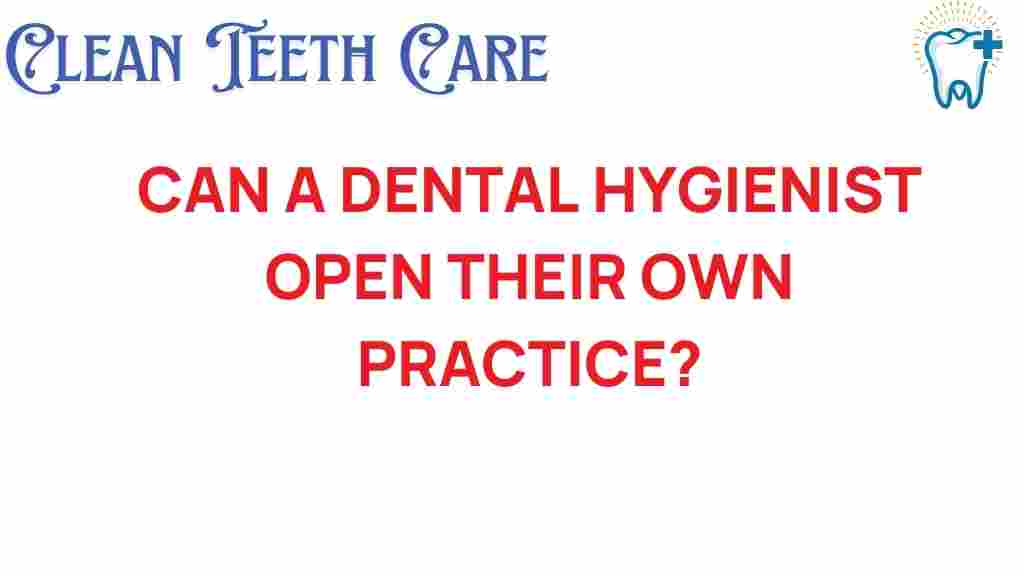Can a Dental Hygienist Launch Their Own Practice?
In the rapidly evolving dental industry, career opportunities are expanding, and many professionals are seeking new ways to enhance their professional growth. One path that has gained traction is the idea of a dental hygienist launching their own practice. While traditionally, dental hygienists worked under the supervision of dentists, the landscape is shifting towards greater autonomy and entrepreneurship. But can a dental hygienist truly establish a successful independent practice? This article explores the untold story of dental hygienists stepping into the realm of private practice.
The Evolving Role of Dental Hygienists
Dental hygienists play a critical role in the healthcare system. They are not just responsible for cleaning teeth; they also educate patients on oral health, assist in preventive care, and help manage dental diseases. As the demand for preventive dental care increases, so does the need for hygienists to take on more responsibilities.
- Patient education: Hygienists inform patients about proper oral hygiene practices.
- Preventive care: They perform cleanings and apply sealants and fluoride treatments.
- Collaboration: Hygienists work closely with dentists to develop comprehensive treatment plans.
With these expanded roles, many dental hygienists are considering the leap into private practice. This transition can provide greater autonomy, financial rewards, and the ability to shape their professional environment. However, it also comes with unique challenges and responsibilities.
Assessing the Market for an Independent Practice
Before diving into the entrepreneurial waters, it’s crucial for dental hygienists to assess the market for their potential independent practice. Here are some factors to consider:
- Community Needs: Understand the demographics and dental health needs of the community.
- Competition: Analyze existing dental practices and their services.
- Specialization: Consider offering niche services that are underserved in your area.
Conducting thorough market research will help dental hygienists identify opportunities and challenges in the local dental landscape, enabling them to create a viable business plan.
Steps to Launching Your Own Dental Hygienist Practice
Launching an independent practice as a dental hygienist involves several key steps. Here’s a guide to help you navigate the process:
1. Education and Licensing
Ensure that you have the necessary education and licensure to practice independently. Most states require dental hygienists to hold an associate’s degree in dental hygiene and to be licensed by the state dental board. Some states allow dental hygienists to work independently without supervision, while others have specific regulations.
2. Business Planning
Develop a comprehensive business plan that outlines your vision, mission, and strategies for your practice. Include:
- Executive Summary: A brief overview of your business.
- Market Analysis: Insights into the dental market and your target audience.
- Financial Projections: Estimated costs, revenue, and profitability.
- Marketing Strategy: How you plan to attract and retain patients.
3. Legal Considerations
Consult with a legal professional to understand the requirements for establishing a dental practice in your state. This may include:
- Obtaining the necessary licenses and permits.
- Understanding liability insurance requirements.
- Complying with healthcare regulations.
4. Location and Equipment
Choose a location that is accessible to your target patients. Consider factors like visibility, parking, and proximity to other healthcare facilities. Additionally, invest in the right equipment and technology to provide high-quality care.
5. Marketing Your Practice
Effective marketing is vital for attracting patients to your new practice. Use a combination of digital and traditional marketing strategies:
- Website: Create a professional website that highlights your services and expertise.
- Social Media: Utilize platforms like Facebook and Instagram to engage with the community.
- Networking: Collaborate with local dental professionals and healthcare providers.
6. Building a Patient Base
Initially, building a patient base may be challenging. Consider offering promotions or community events to draw in new clients. Providing exceptional service will encourage word-of-mouth referrals and help establish a loyal patient base.
Troubleshooting Tips for New Practice Owners
As with any business venture, challenges will arise. Here are some common issues dental hygienists may face when launching their own practice, along with tips to overcome them:
1. Financial Management
Managing finances can be daunting for new business owners. Consider hiring an accountant or using accounting software to keep track of expenses and revenue. Set a budget and stick to it to avoid financial pitfalls.
2. Patient Retention
Attracting new patients is important, but retaining them is crucial. Focus on providing exceptional patient care, follow-up communications, and loyalty programs to keep patients coming back.
3. Work-Life Balance
Starting a practice can be time-consuming and stressful. Ensure you set boundaries to maintain a healthy work-life balance. Schedule time for self-care and personal activities to avoid burnout.
The Benefits of Owning an Independent Practice
Despite the challenges, there are numerous benefits to establishing a private practice as a dental hygienist:
- Autonomy: You have the freedom to make decisions about your practice and patient care.
- Financial Rewards: With a successful practice, you can potentially earn a higher income than working as an employee.
- Professional Growth: Owning a practice allows you to expand your skills and knowledge in business management and patient care.
Additionally, owning a practice can lead to greater job satisfaction and the opportunity to create a positive impact in your community through better dental health.
Conclusion
In conclusion, the journey to becoming a successful dental hygienist in private practice is both challenging and rewarding. With the right preparation, education, and business acumen, dental hygienists can thrive as independent practitioners. As the healthcare landscape continues to evolve, so do the opportunities for entrepreneurial hygienists to make their mark. If you’re considering this path, remember that diligent planning, a commitment to patient care, and a passion for the dental industry will be your keys to success.
For more resources on launching your dental practice, check out this informative article on entrepreneurship in healthcare. To connect with fellow dental hygienists, visit our community forum for support and networking.
This article is in the category Conditions and created by CleanTeethCare Team
